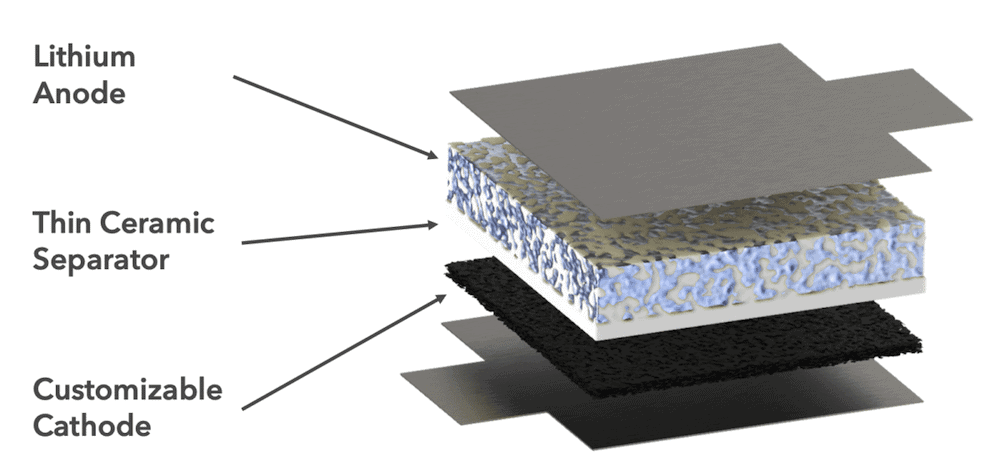
[Image above] The Ion Storage Systems solid-state battery structure enables uniform and continuous pathways for lithium ions to move between anode and cathode with significantly lower resistance for higher power. The anode is filled with high-capacity lithium metal that enables higher energy density for lighter batteries. The battery is cathode-agnostic, enabling customers to select cathode materials based on application. Credit: Ion Storage Systems
In the past decade, the number of people purchasing electric vehicles for personal use has increased immensely, to the point that electric car registration even increased in 2020 despite the COVID-19 pandemic.
The demand for electric vehicles is undoubtable, yet how best to meet this demand technologically remains an open question.
Lithium-ion batteries are the most used technology currently for powering plug-in hybrids and all-electric vehicles. However, Li-ion batteries have their limitations, and researchers are actively exploring alternative power sources for the next-generation of electric vehicles.
Solid-state batteries are one technology of extreme interest for electric vehicle applications. These batteries feature a solid electrolyte rather than liquid electrolyte, thus eliminating the risk of battery fires, plus they boast higher performance, longer lifecycles, and wide operating ranges.
In a review paper published last year by nanoengineers at the University of California, San Diego, it’s stated that one of the main challenges to commercializing solid-state batteries is developing scalable and cost-effective manufacturing. Ion Storage Systems in College Park, Maryland, is working to tackle this challenge.
Ion Storage Systems is an energy startup that aims to commercialize solid-state batteries. The company started its journey at the University of Maryland in 2012, applying for its first patent in 2013, before exciting the university and forming as an LLC in 2015.
Ion Storage Systems has received a lot of support and recognition for its work, including being named a winner of the LG Chem Battery Challenge and being named a top 20 future start-up company in Maryland. Most recently, the company was awarded its first contract with The United States Advanced Battery Consortium LLC (USABC) for a beyond lithium-ion technology assessment program.
USABC is a subsidiary of the United States Council for Automotive Research LLC (USCAR). Enabled by a cooperative agreement with the U.S. Department of Energy, USABC’s mission is to develop electrochemical energy storage technologies that enable widespread commercialization in vehicle applications. In support of its mission, USABC has developed mid- and long-term goals to guide its projects and measure its progress.
“This beyond lithium-ion technology assessment program contract with Ion Storage Systems is part of USABC’s broad battery technology research and development program,” says Steve Zimmer, executive director of USCAR, in a press release announcing the contract. “Programs like this are critical to advancing the technology needed to meet both near- and long-term goals that will enable broader scale vehicle electrification.”
The $487,310 contract with Ion Storage Systems, which includes a 50 percent cost share, funds a 15-month project that began earlier this year. The focus of the program is to demonstrate Ion Storage Systems’ high-rate, high-energy density, solid-state batteries as a safe and versatile option for a wide operating range of automotive applications.
In an email, Eric Wachsman, executive chair of Ion Storage Systems and director of the Maryland Energy Innovation Institute, says “this USABC award for my company is tremendous recognition of the breakthroughs we achieved in advancing battery technology. From being the first to develop a surface modification to solve the Li-metal wetting issue for ceramic electrolytes to developing a transformational 3D ceramic structure that enables us to be the only solid-state technology to achieve the DOE Fast Charge Goal for Li-metal cycling at room temperature, we’re developing solid-state batteries that are the future of energy storage.”
Learn more about Ion Storage Systems and its research at https://ionstoragesystems.com.
Author
Greg Geiger


